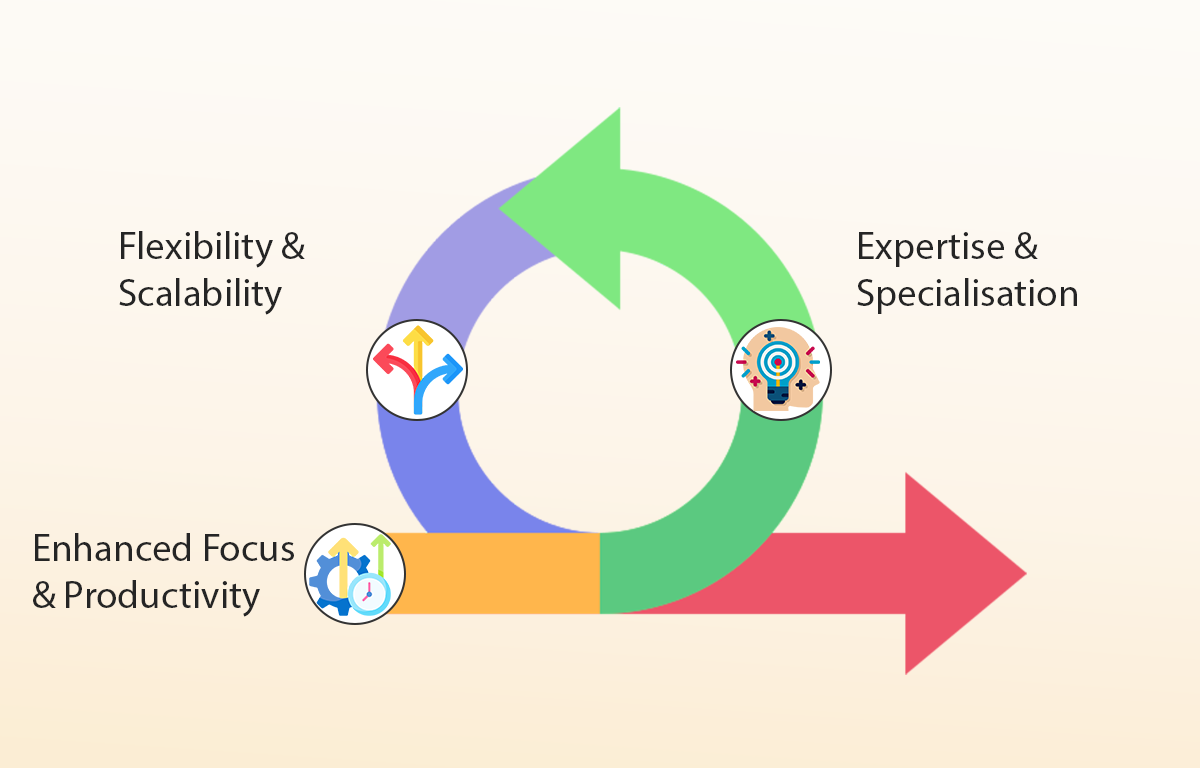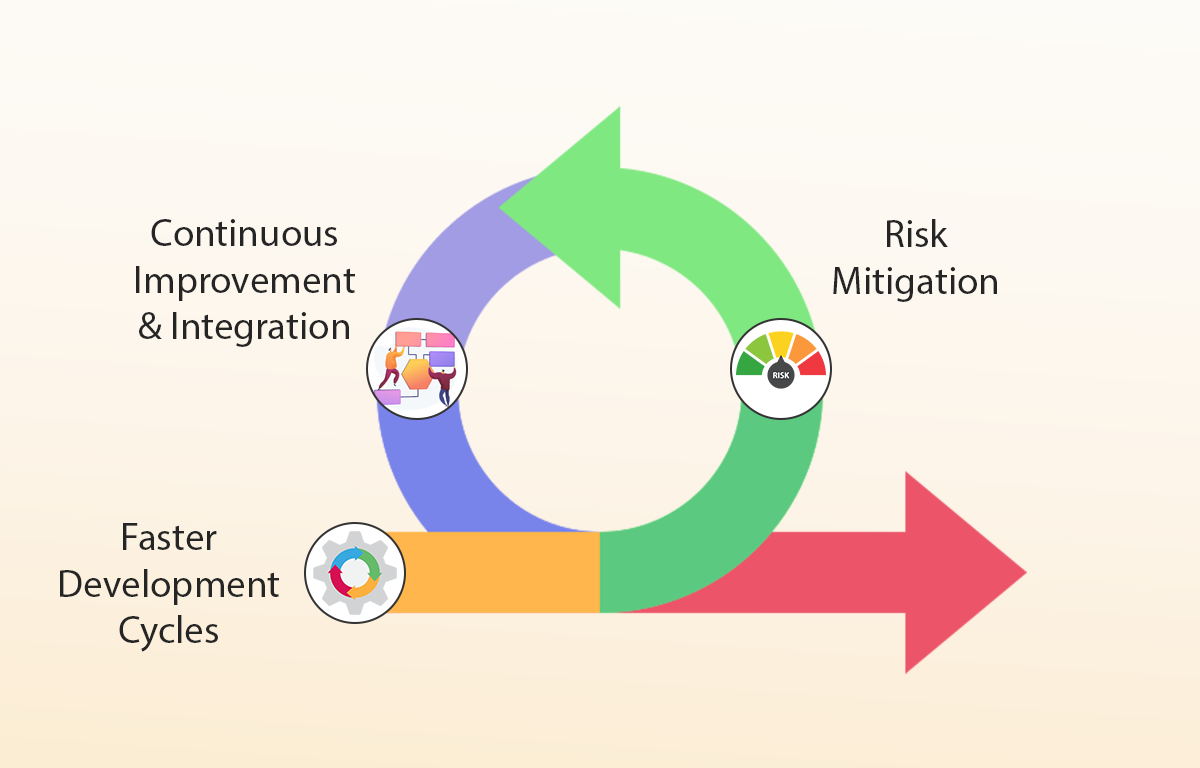In today’s fast-paced tech world, the agility to adapt and deliver quickly is more than just a competitive edge—it's a survival skill. As technology evolves at an appreciative rate, businesses increasingly adopt IT consulting services to keep up with the rapid pace of change. Agile development focuses on flexibility, continuous improvement, and, most importantly, quick adaptation to change. However, the effectiveness of this methodology hinges significantly on the team's composition. This is where dedicated teams come into play, proving crucial in navigating the Agile landscape effectively.
Dedicated teams bring a focused approach to projects, essential for achieving the high responsiveness required by Agile practices. Unlike mixed or temporary project teams, dedicated teams are
Dedicated teams bring a focused approach to projects, essential for achieving the high responsiveness required by Agile practices. Unlike mixed or temporary project teams, dedicated teams are
- Niche Expertise
- Allowing for a better understanding
- Stronger relationships within and with stakeholders
- Maintain flexibility
Role of Dedicated Teams in Tech Development
The IT consulting services-focused commitment streamlines the workflow and injects contagious efficiency across the project. Here's how these teams make a real difference in the tech world.
Accelerating Development: One of the most significant advantages of having a dedicated team is the development speed. Because the team is focused solely on one project, fewer distractions and delays exist. This concentrated effort leads to faster turnaround times from ideation to deployment.
Maintaining Quality: Quality is never compromised. With a dedicated team, each member becomes deeply familiar with the project's standards and goals. This familiarity allows for a higher standard of quality control at every project stage because the team understands the 'why' behind the work, not just the 'how'.
Flexibility in Project Management: Agile projects are all about flexibility, and dedicated teams embody this by being able to respond faster to feedback or changes in the market. This flexibility is important for staying relevant and competitive.
Dedicated development teams provide professional IT consulting services and are centred around delivering high-quality by:
Accelerating Development: One of the most significant advantages of having a dedicated team is the development speed. Because the team is focused solely on one project, fewer distractions and delays exist. This concentrated effort leads to faster turnaround times from ideation to deployment.
Maintaining Quality: Quality is never compromised. With a dedicated team, each member becomes deeply familiar with the project's standards and goals. This familiarity allows for a higher standard of quality control at every project stage because the team understands the 'why' behind the work, not just the 'how'.
Flexibility in Project Management: Agile projects are all about flexibility, and dedicated teams embody this by being able to respond faster to feedback or changes in the market. This flexibility is important for staying relevant and competitive.
Dedicated development teams provide professional IT consulting services and are centred around delivering high-quality by:
- Deep Collaboration: Closer team unity and better problem-solving together.
- Consistent Communication: Regular updates and fewer misunderstandings.
- Enhanced Innovation: More room for creative solutions without the constraints of shifting focus.
- Risk Mitigation: Familiarity with the project reduces the chances of errors.
Key Benefits of Dedicated Teams

Enhanced Focus and Productivity
Imagine having a team that breathes your project's air morning, noon, and night. That's what a dedicated team does—completely immerse themselves in your project. This intense focus leads to the following:
- Streamlined Processes: Every step is refined and optimised for your specific project.
- Quicker Turnarounds: With no need to juggle multiple clients or projects, the team moves faster.
- Higher Quality Outputs: More attention to detail means fewer errors and higher standards.
Flexibility and Scalability
Agile projects are like living organisms; they evolve. Dedicated teams are built to adapt to these evolutions swiftly and efficiently. Here’s how they manage:
- Adapt to Changes: They can pivot quickly without the burden of other project commitments.
- Scale on Demand: Do you need more hands on deck? Dedicated teams can expand their numbers or skills based on project requirements without a hitch.
Expertise and Specialisation
Dedicated teams aren't just groups of people working together—they're carefully chosen experts, each with a deep-dive knowledge set tailored to the project's needs. This specialization leads to:
- Innovative Solutions: Expert insights mean creative solutions that a more generalized team might not see.
- Efficient Problem Solving: Specialists can foresee potential pitfalls and navigate around them more effectively.
Role of Dedicated Teams in Accelerating Agile Projects

Faster Development Cycles
In the fast-paced realm of Agile projects, time is of the essence, and dedicated teams are the speed champions. By focusing solely on one project, these teams minimize the usual back-and-forths and waiting times that can slow down progress. Here’s how they speed things up:
- Reduced Delays: With no other projects, dedicated teams can move from one task to another without pause.
- Fewer Dependencies: Each team member knows their role inside out, which reduces reliance on people outside the team.
- Streamlined Communication: Less formal chains of command mean quicker decisions and faster execution.
Continuous Improvement and Integration
Agile is about evolving through continuous improvement, and dedicated teams are perfectly poised to foster this continuous growth. They work in tight feedback loops with stakeholders, allowing for:
- Immediate Feedback Implementation: Changes can be made on the fly, not just at scheduled intervals.
- Real-Time Problem Solving: Issues are addressed as they arise, not after they’ve caused significant delays.
- Regular Product Enhancements: With ongoing development, improvements are integrated regularly, keeping the product fresh and aligned with user needs.
The dynamic nature of dedicated teams ensures that your project is keeping up with and setting the pace in today’s technological race.
Risk Mitigation
When handling potential pitfalls, dedicated teams have a distinct advantage. Their deep familiarity with the project allows them to foresee risks and tackle them proactively. Here’s what makes IT consulting services effective at risk management:
- Proactive Issue Identification: Knowing the project inside out means smaller problems don’t turn into bigger ones unnoticed.
- Quick Response Times: Close-knit teams can mobilize quickly to address risks before they impact the project.
- Consistent Monitoring: Ongoing scrutiny of project health helps in early detection and mitigation of risks.
Implementing Dedicated Teams: Best Practices
Clear Communication Channels
Clear and direct communication is the backbone of any successful project, especially when implementing dedicated teams. To make sure everyone is on the same page begins with establishing robust communication channels. Here’s why clear communication is non-negotiable:
Regular Training and Updates
Keeping a dedicated team at the top of its game involves continuous learning and adaptation. Here are some strategies to ensure your team remains up-to-date:
Building a Collaborative Culture
The magic of dedicated teams often lies in how well they work together. Creating a culture that promotes collaboration and openness is crucial. Here’s how to foster this environment:

Clear and direct communication is the backbone of any successful project, especially when implementing dedicated teams. To make sure everyone is on the same page begins with establishing robust communication channels. Here’s why clear communication is non-negotiable:
- Transparency: Everyone understands the project status, what’s expected next, and how they contribute.
- Efficiency: Reduces misunderstandings and the need for frequent clarifications.
- Stakeholder Satisfaction: Regular updates keep stakeholders informed and confident in the team’s progress.
Regular Training and Updates
Keeping a dedicated team at the top of its game involves continuous learning and adaptation. Here are some strategies to ensure your team remains up-to-date:
- Scheduled Training Sessions: Regularly set aside time for training in new technologies and Agile methodologies.
- Learning Resources: Provide access to courses, webinars, and conferences.
- Knowledge Sharing: You can encourage team members to share their knowledge or market insights.
Building a Collaborative Culture
The magic of dedicated teams often lies in how well they work together. Creating a culture that promotes collaboration and openness is crucial. Here’s how to foster this environment:
- Team Building Activities: Engage in regular activities that bolster team spirit and camaraderie.
- Open-door Policy: Encourage open discussions about challenges and innovations.
- Recognition and Rewards: Acknowledge team successes and individual contributions to build a sense of accomplishment.

Conclusion
In the agile tech development world, where the only constant is change, having a dedicated team isn't just a nice-to-have; it's a strategic necessity. The cohesive nature of IT consulting services, with their singular focus, deep expertise, and strong communication, equips them to navigate the rapid iterations and evolving requirements typical in Agile projects. These teams bring a level of commitment and continuity that is pivotal in turning Agile principles into successful outcomes. They ensure that projects keep pace with and often exceed expectations by delivering high-quality work efficiently and effectively.
Dedicated teams' importance extends beyond project execution; they foster an environment ripe for innovation, where every team member is tuned to the project’s goals and challenges. This alignment enhances problem-solving and creativity, ensuring that the project progresses smoothly and adapts and thrives in the face of new opportunities and challenges. For businesses looking to leverage Agile methodologies to their fullest, investing in dedicated teams is not just an operational decision but a critical component of strategic success.
Dedicated teams' importance extends beyond project execution; they foster an environment ripe for innovation, where every team member is tuned to the project’s goals and challenges. This alignment enhances problem-solving and creativity, ensuring that the project progresses smoothly and adapts and thrives in the face of new opportunities and challenges. For businesses looking to leverage Agile methodologies to their fullest, investing in dedicated teams is not just an operational decision but a critical component of strategic success.


.webp?lang=en-US&ext=.webp)

.webp?lang=en-US&ext=.webp)

